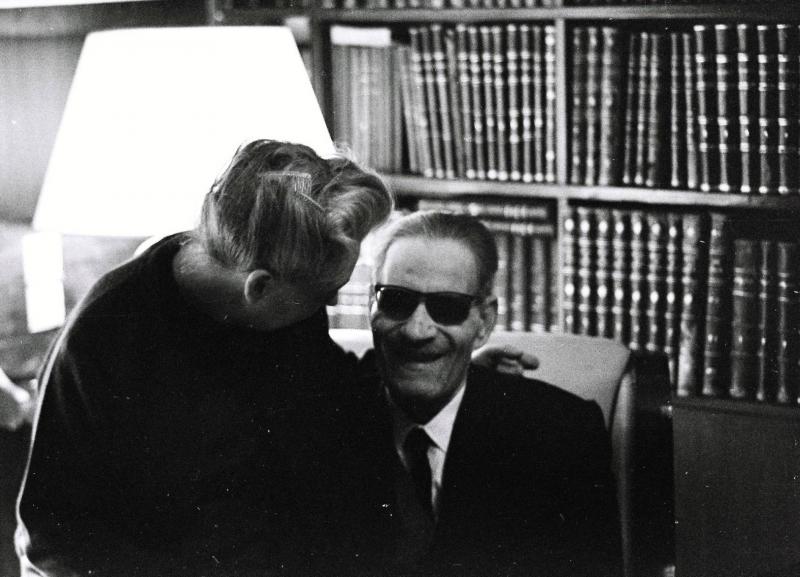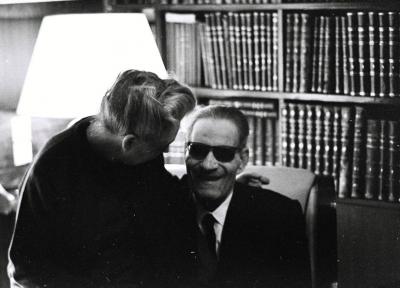In a document dating back to 1912, Taha Hussein demanded an investigation into an employee who mistreated him for delaying his tuition payments. He also set a meeting with university director Ahmed Zaki Pasha to address his complaint and urged him to reprimand the employee, stating, "The university is built on the effort of the student and the professor."
An Egyptian researcher has revealed a document indicating that Taha Hussein, known as "the Dean of Arabic Literature," led the first student union at the Egyptian University, which later became Cairo University. She also presented other documents confirming that he received top grades in all subjects except one. Document specialist at the Faculty of Arts at Cairo University, Gihan Imran, showcased a collection of rare documents from Taha Hussein's professional archive preserved in Cairo University during a seminar held at the French Cultural Center in the Egyptian capital to commemorate the 50th anniversary of the great thinker and novelist's death.
Former Egyptian Minister of Culture and researcher in history and documents, Emad Abu Ghazi, noted that the document redefines the history of the student movement and reveals the origins of the first student group representing the university's demands. Taha Hussein enrolled in Cairo University after its establishment in 1908, coinciding with his studies at Al-Azhar, and received the first doctorate awarded by the university in 1914 before being sent to France for a second doctorate, marking the beginning of his influential academic career in the history of Arabic literature.
Gihan Imran presented about 35 documents found in Cairo University's archives as part of Taha Hussein's employment file, starting from his appointment at the Faculty of Arts in 1925 and ending in 1961. She noted that Taha Hussein's case is unique because professors' archives usually begin upon their employment, while the university possesses documents for Taha Hussein from his enrollment and throughout his time in France.
The document expert revealed 17 documents related to Taha Hussein's academic results and exam scores, stating, "He received the highest grades in all subjects except one," adding that his French language professors noted his brilliance and superiority compared to his peers. She also mentioned that Taha Hussein took exams for ten subjects over five consecutive days during his first year, averaging two exams per day to combine both semesters.
The researcher asserted that these documents reveal Taha Hussein's genius and clear brilliance despite losing his eyesight at an early age. Gihan Imran also uncovered other documents regarding the financial amounts he paid for tuition and examination fees, which did not exceed one Egyptian pound, but Taha Hussein considered them burdensome for his family and referenced this in his famous autobiography, "The Days."
One document detailed Taha Hussein forming a "student group" with other students to represent them before university administration as a reaction to the administrative staff's misconduct due to his delayed fee payment. Taha Hussein requested an investigation into an employee's mistreatment of him due to his slow payment in a 1912 document and specified a meeting time with university director Ahmed Zaki Pasha to address his complaint. He urged Pasha to reprimand the employee, emphasizing that "the university is built on the effort of the student and the professor."
Another document revealed a memorandum presented by Taha Hussein indicating his Al-Azhar teachers' approval for his enrollment at the Egyptian University. Abu Ghazi remarked that Gihan Imran's contributions highlight the importance of using alternative archives to write our history, whether from journalistic archives, family archives, or those within related institutions.
He expressed regret over the incomplete process of gathering Taha Hussein’s journalistic legacy despite committees formed for this purpose since the 1990s. Abu Ghazi stated, "Egypt suffers from a massive issue regarding the absence of a comprehensive national archive that includes all the documents necessary to write its history." He pointed out that existing official archives are not accessible to researchers and that access is subjected to regulations that hinder a researcher-friendly environment.
He also noted that the inaccessibility of documents forces researchers to rely on foreign archives, which generally consist of correspondence from foreign diplomats, stating, "These sources are important, but they should be treated cautiously."
Journalist Ibrahim Abdelaziz, an expert in archival research, presented a collection of letters sent to and from Taha Hussein, which he obtained from his family. He mentioned that the letters revealed the family's modest financial situation, to the extent that Taha Hussein struggled to pay for his tuition. Another letter from a high school student, written to him when he was Minister of Education in 1950, requested an old suit to wear to school, with Taha continuously providing him with financial aid until the student graduated and became an expert in translation.
Abdelaziz confirmed that Taha Hussein became the Minister of Education in the last government formed by the Wafd Party in 1950 because Naguib El-Hilali Pasha, who had served as Minister of Education in several governments formed by the party, declined the role for family reasons, and Taha Hussein was the Director General of the General Administration of Culture in the ministry, making his nomination natural.




